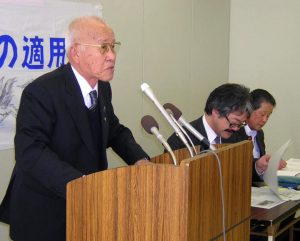Takashi Morita, A-bomb survivor in Brazil, dies at 100
Aug. 14, 2024
Takashi Morita, an A-bomb survivor living in Brazil who led atomic bomb survivors living in South America and paved the way for them to receive aid, died of old age at a hospital in São Paulo at 5:55 p.m. local time on August 12. He was 100 years old. Mr. Morita was originally from the village of Yuki-cho (now part of Hiroshima’s Saeki Ward). The funeral service will take place in São Paulo on August 13, local time.
On that morning in 1945, Mr. Morita, who was a military police officer for the former Japanese military, was finishing up an air-raid shelter in the city’s Yamate-cho (now part of Nishi Ward), about 1.3 kilometers from the hypocenter, when he was exposed to the atomic bombing. He was badly burned, but carried the injured Prince Lee-Woo of Korea, whom he encountered near the hypocenter, to the Ujina area.
He and his family emigrated to Brazil in 1956, and in 1984 he founded the Association of A-bomb Survivors in Brazil and became its president. While running a grocery store in São Paulo, he supported the survivors living in the vast South American countries who worried about the aftereffects of exposure to the bomb’s radiation.
In March 2002, he filed a lawsuit against the Japanese government for health care benefits under the Atomic Bomb Survivors Relief Law that were cut off after they crossed the water. He also led the campaign, together with survivors in Korea and the United States, for the application of the Relief Law to those living outside Japan. At the same time, he continued to share his atomic bomb account in Brazil, making the term “hibakusha” (atomic bomb survivor) known.
He turned 100 in March of this year. When the state vocational high school named after him in southern São Paulo held a celebration of his 100th birthday, Mr. Morita showed up looking good. He met with Prime Minister Fumio Kishida during his visit to Brazil in May.
(Originally published on August 14, 2024)
On that morning in 1945, Mr. Morita, who was a military police officer for the former Japanese military, was finishing up an air-raid shelter in the city’s Yamate-cho (now part of Nishi Ward), about 1.3 kilometers from the hypocenter, when he was exposed to the atomic bombing. He was badly burned, but carried the injured Prince Lee-Woo of Korea, whom he encountered near the hypocenter, to the Ujina area.
He and his family emigrated to Brazil in 1956, and in 1984 he founded the Association of A-bomb Survivors in Brazil and became its president. While running a grocery store in São Paulo, he supported the survivors living in the vast South American countries who worried about the aftereffects of exposure to the bomb’s radiation.
In March 2002, he filed a lawsuit against the Japanese government for health care benefits under the Atomic Bomb Survivors Relief Law that were cut off after they crossed the water. He also led the campaign, together with survivors in Korea and the United States, for the application of the Relief Law to those living outside Japan. At the same time, he continued to share his atomic bomb account in Brazil, making the term “hibakusha” (atomic bomb survivor) known.
He turned 100 in March of this year. When the state vocational high school named after him in southern São Paulo held a celebration of his 100th birthday, Mr. Morita showed up looking good. He met with Prime Minister Fumio Kishida during his visit to Brazil in May.
(Originally published on August 14, 2024)








